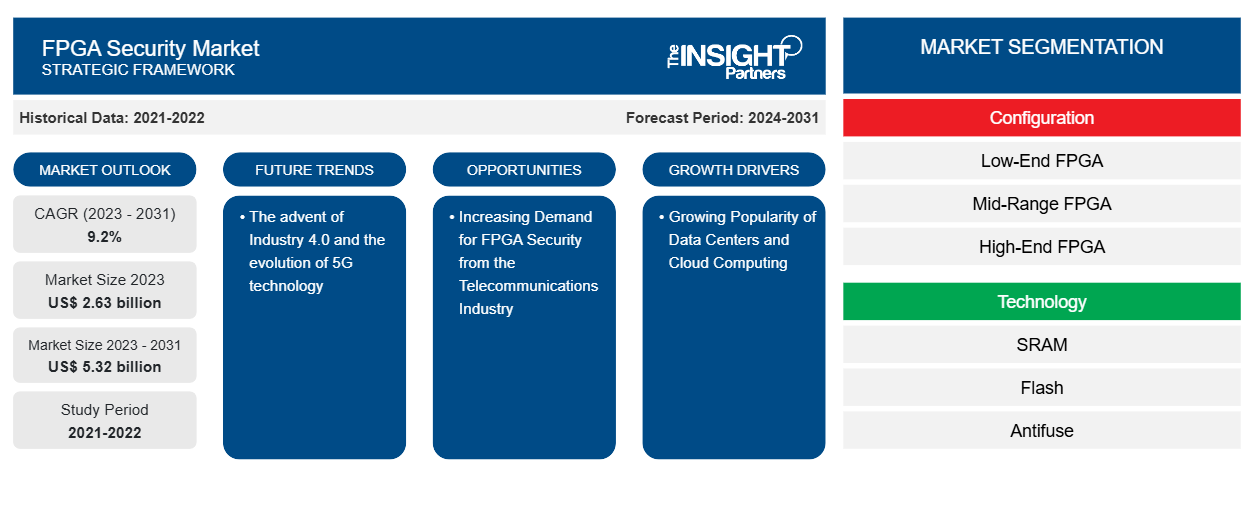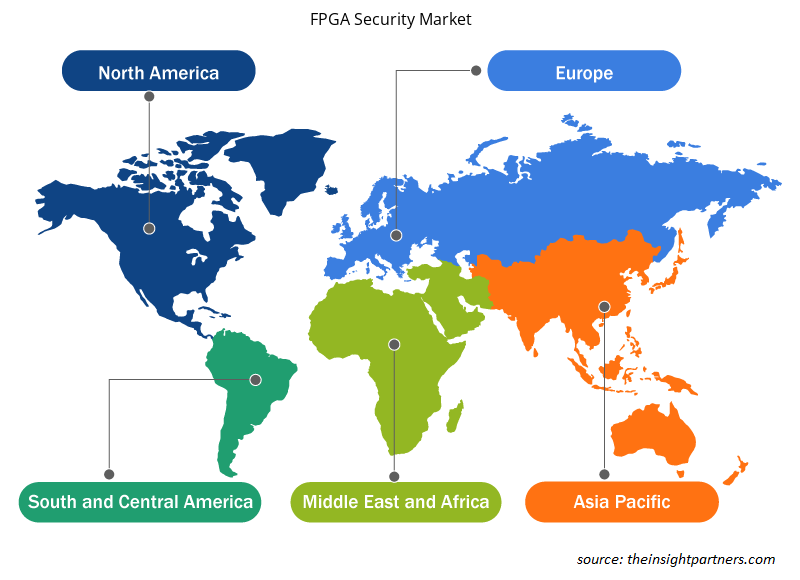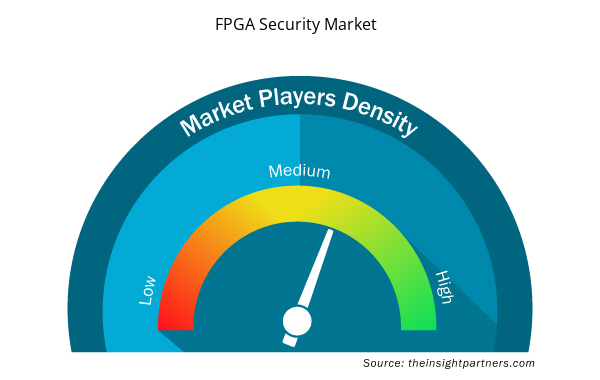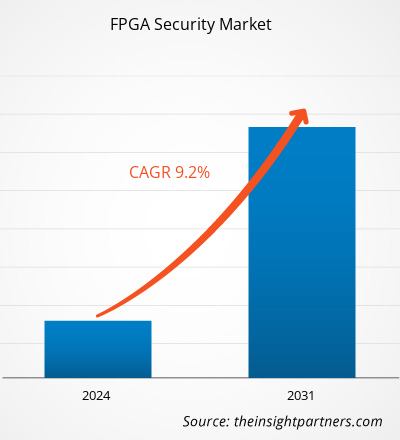The FPGA security market size is projected to reach US$ 5.32 billion by 2031 from US$ 2.63 billion in 2023. The market is expected to register a CAGR of 9.2% in 2023–2031. The advent of Industry 4.0 and the evolution of 5G technology is likely to remain a key FPGA security market trend.
FPGA Security Market Analysis
The FPGA security market is growing at a rapid pace due to the growing popularity of data centers and cloud computing and the integration of FPGA security technology into advanced driver-assistance systems. The market is expanding steadily, driven by the rising demand for FPGA security in connected vehicles, intelligent buildings, power grids, and urban infrastructure. Moreover, the increasing demand for FPGA security from the telecommunications industry is providing lucrative opportunities for market growth.
FPGA Security Market Overview
Field programmable gate array (FPGA) security is a silicon integrated circuit (IC) device/chip made up of memory, arrays of programmable logic gates, or other components. Industries can use these FPGA arrays to design their own digital circuitry. Industries can also overwrite current configurations by adding additional functionality or meeting application requirements. The programming of FPGA security is as simple as using a single logic gate, such as the OR AND function. This security solution supports manufacturers to secure their designs, authentication, and confidentiality information of internal FPGA hardware. The demand for FPGA security is associated with the expanding telecommunications industry, and the growing deployment of ICs to address high bandwidth requirements is boosting the market.
Customize This Report To Suit Your Requirement
You will get customization on any report - free of charge - including parts of this report, or country-level analysis, Excel Data pack, as well as avail great offers and discounts for start-ups & universities
FPGA Security Market: Strategic Insights

- Get Top Key Market Trends of this report.This FREE sample will include data analysis, ranging from market trends to estimates and forecasts.
You will get customization on any report - free of charge - including parts of this report, or country-level analysis, Excel Data pack, as well as avail great offers and discounts for start-ups & universities
FPGA Security Market: Strategic Insights

- Get Top Key Market Trends of this report.This FREE sample will include data analysis, ranging from market trends to estimates and forecasts.
FPGA Security Market Drivers and Opportunities
Growing Popularity of Data Centers and Cloud Computing is Driving the Market
Data security solutions have become increasingly important due to the growing popularity of data centers and cloud computing. Cloud security architects can improve data center authentication by implementing bitstream authentication technologies. Various industries are focusing on safeguarding data transmission endpoints from hazardous data, which increases the demand for FPGA security among industries. FPGAs can provide industrial controls with higher levels of security for periodically updated antivirus databases. Cyberattacks commonly target various network topologies with minimal encryption and security measures, which increases the adoption of FPGA security to protect data against cyberattacks. FPGAs worked with reprogrammed algorithms and cryptographic protocols to accelerate loop execution and parallelization. This supports industries in securing their data and information from external threats.
Increasing Demand for FPGA Security from the Telecommunications Industry – An Opportunity in the FPGA Security Market
The telecommunications industry is one of the most promising, with a strong need for FPGA security solutions. The global telecom industry is expanding due to increased investment and development in communication infrastructure in both developed and developing countries. The adoption of IoT, AI, and edge computing technologies are shifting customer needs and preferences for advanced security solutions are creating opportunities for companies operating in the telecommunications industry.
The industry involves complex operations, rising customer demand for data security, and the operating requirements of equipment/hardware used in their industry, generating significant opportunities for market growth. FPGAs are widely used in this business for a range of applications, such as packet processing and data packet switching. Significant benefits provided by FPGAs, such as ease of configurability, flexibility, effective hardware acceleration, low latency operations, and low prices, are creating opportunities in the telecommunication industry.
FPGA Security Market Report Segmentation Analysis
Key segments that contributed to the derivation of the FPGA security market analysis are configuration, technology, and end user.
- Based on configuration, the FPGA security market is divided into low-end FPGA, mid-range FPGA, and high-end FPGA. The low-end FPGA segment held a larger market share in 2023.
- Based on technology, the FPGA security market is divided into SRAM, flash, and antifuse. The SRAM segment held a larger market share in 2023.
- On the basis of end user, the market is segmented into telecommunications, consumer electronics, data centers and computing, military and aerospace, industrial, automotive, and other end users. The telecommunications segment held the largest share of the market in 2023.
FPGA Security Market Share Analysis by Geography
The geographic scope of the FPGA security market report is mainly divided into five regions: North America, Asia Pacific, Europe, Middle East & Africa, and South America/South & Central America.
In terms of revenue, Asia Pacific accounted for the largest FPGA security market share, due to growing demand for data processing, high-performance computing, and efficient working solutions in the data center environment. The evolution of modern data centers surged the demand for FPGA security for handling complex tasks. Increasing investment by industries to develop robust data center infrastructure is creating demand for FPGA security for securing data from threats. The market in Asia Pacific is projected to expand during the forecast period, due to growing demand for high-speed mobile devices and broadband services. The market in India and China is growing at a significant pace owing to growing usage of mobile devices, expansion of telecommunication, and rising demand for broadband services.
FPGA Security Market Regional Insights
The regional trends and factors influencing the FPGA Security Market throughout the forecast period have been thoroughly explained by the analysts at Insight Partners. This section also discusses FPGA Security Market segments and geography across North America, Europe, Asia Pacific, Middle East and Africa, and South and Central America.

- Get the Regional Specific Data for FPGA Security Market
FPGA Security Market Report Scope
| Report Attribute | Details |
|---|---|
| Market size in 2023 | US$ 2.63 billion |
| Market Size by 2031 | US$ 5.32 billion |
| Global CAGR (2023 - 2031) | 9.2% |
| Historical Data | 2021-2022 |
| Forecast period | 2024-2031 |
| Segments Covered |
By Configuration
|
| Regions and Countries Covered | North America
|
| Market leaders and key company profiles |
FPGA Security Market Players Density: Understanding Its Impact on Business Dynamics
The FPGA Security Market is growing rapidly, driven by increasing end-user demand due to factors such as evolving consumer preferences, technological advancements, and greater awareness of the product's benefits. As demand rises, businesses are expanding their offerings, innovating to meet consumer needs, and capitalizing on emerging trends, which further fuels market growth.
Market players density refers to the distribution of firms or companies operating within a particular market or industry. It indicates how many competitors (market players) are present in a given market space relative to its size or total market value.
Major Companies operating in the FPGA Security Market are:
- Achronix Semiconductor Corporation
- Efinix, Inc.
- Flex Logix Technologies, Inc.
- Intel Corporation
- Lattice Semiconductor Corporation
- LeafLabs, LLC
Disclaimer: The companies listed above are not ranked in any particular order.

- Get the FPGA Security Market top key players overview
FPGA Security Market News and Recent Developments
The FPGA security market is evaluated by gathering qualitative and quantitative data post primary and secondary research, which includes important corporate publications, association data, and databases. The following is a list of developments in the market for FPGA security and strategies:
- In September 2023, Lattice Semiconductor Corporation announced the Lattice CrossLinkU-NX FPGA family, the industry’s first FPGAs with integrated USB device functionality in their class. CrossLinkU-NX FPGAs help accelerate USB-equipped system designs and simplify thermal management through a combination of a hardened USB controller and physical layer (PHY), a unique low-power standby mode, and a complete set of reference designs. (Source: Lattice Semiconductor Corporation, Press Release, 2023)
- In June 2023, Microchip Technology Inc. launched the industry’s most power-efficient mid-range FPGA industrial edge stack, ready-to-customize cryptography and boot libraries of soft intellectual property (IP), and new tools to convert existing FPGA designs to PolarFire devices. It also enables secure edge-to-compute analytics, machine learning, and high-availability data interconnect for Industrial IoT endpoints. (Source: Microchip Technology Inc., Press Release, 2023)
FPGA Security Market Report Coverage and Deliverables
The “FPGA Security Market Size and Forecast (2021–2031)” report provides a detailed analysis of the market covering below areas:
- Market size and forecast at global, regional, and country levels for all the key market segments covered under the scope
- Market dynamics such as drivers, restraints, and key opportunities
- Key future trends
- Detailed PEST/Porter’s Five Forces and SWOT analysis
- Global and regional market analysis covering key market trends, major players, regulations, and recent market developments
- Industry landscape and competition analysis covering market concentration, heat map analysis, prominent players, and recent developments
- Detailed company profiles
- Historical Analysis (2 Years), Base Year, Forecast (7 Years) with CAGR
- PEST and SWOT Analysis
- Market Size Value / Volume - Global, Regional, Country
- Industry and Competitive Landscape
- Excel Dataset


- Artificial Intelligence in Healthcare Diagnosis Market
- Lymphedema Treatment Market
- Transdermal Drug Delivery System Market
- Real-Time Location Systems Market
- Quantitative Structure-Activity Relationship (QSAR) Market
- Hand Sanitizer Market
- Dried Blueberry Market
- Equipment Rental Software Market
- Medical Devices Market
- Webbing Market

Report Coverage
Revenue forecast, Company Analysis, Industry landscape, Growth factors, and Trends

Segment Covered
Configuration ; Technology ; End User

Regional Scope
North America, Europe, Asia Pacific, Middle East & Africa, South & Central America

Country Scope
Argentina, Australia, Brazil, Canada, China, France, Germany, India, Italy, Japan, Mexico, Russian Federation, Saudi Arabia, South Africa, South Korea, United Arab Emirates, United Kingdom, United States
Frequently Asked Questions
What is the estimated market size for the global FPGA security market in 2023?
The global FPGA security market was estimated to be US$ 2.63 billion in 2023 and is expected to grow at a CAGR of 9.2% during the forecast period 2023 - 2031.
What are the driving factors impacting the global FPGA security market?
The growing popularity of data centers and cloud computing and the integration of FPGA security technology into advanced driver-assistance systems are the major factors that propel the global FPGA security market.
What are the future trends of the global FPGA security market?
The advent of Industry 4.0 and the evolution of 5G technology is anticipated to play a significant role in the global FPGA security market in the coming years.
Which are the key players holding the major market share of the global FPGA security market?
The key players holding majority shares in the global FPGA security market are Achronix Semiconductor Corporation, Efinix, Inc., Flex Logix Technologies, Inc., Intel Corporation, and Lattice Semiconductor Corporation.
What is the incremental growth of the global FPGA security market during the forecast period?
The incremental growth expected to be recorded for the global FPGA security market during the forecast period is US$ 2.69 billion.
What will be the market size of the global FPGA security market by 2031?
The global FPGA security market is expected to reach US$ 5.32 billion by 2031.

 Get Free Sample For
Get Free Sample For